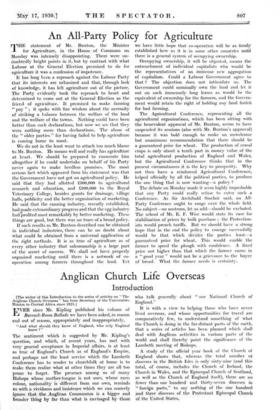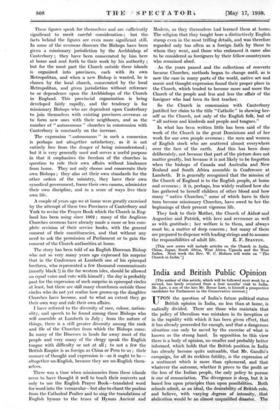Anglican Church Life Overseas
Introduction
(The writer of this Introduction to the series of articles on " The Anglican Church Overseas " has been Secretary of the Universities Mission to Central Africa since 1925.]
FVER since. Mr. Kipling published his volume of Barrack-Room Ballads we have been asked, in season and out of season, appropriately and inappropriately,
"And what should they know of England, who only England know ? "
The sentiment which is suggested by Mr. Kipling's question, and which, of recent years, has met with very general acceptance in Imperial affairs, is at least as true of England's Church as of England's Empire, and perhaps not the least service which the Lambeth Conference has to render to churchfolk at home is to make them realize what at other times they are all too prone, to forget. The presence among us of many Bishops whose mother-tongue is not ours, whose race; colour, nationality is different from our own, reminds us with a vividness and insistence which we can scarcely ignore that , 'the Anglican Communion is a bigger and broader thing by far-than what is envisaged by thoie who talk generally about " our National Church of England."
It is with a view to helping those who have never lived overseas, and whose opportunities for travel are comparatively few, to understand something of what the Church is doing in the far-distant parts of the earth, that a series of articles has been planned which shall deal with Anglican activities in various parts of the world and shall thereby point the significance of the Lambeth meeting of Bishops.
A. study of the official year book of the Church of England shows that, whereas the total number of dioceses in the British Isles is only sixty-nine (and this total, of course, includes the Church of Ireland, the Church in Wales, and the Episcopal Church of Scotland, as well as the Church of England itself), there are no fewer than one hundred and thirty-seven dioceses in " foreign parts," to say nothing of the one hundred and three dioceses of the Protestant Episcopal Church of the United States, These figures speak for themselves and are sufficiently significant to merit careful- consideration.; but the- facts behind the figures are even more -significiiiit still.
In some of the overseas dioceses the -Bishops have 'been given a missionary. jurisdiction by the Archbishop of Canterbury ; they have' been consecrated by him here at home and sent forth to their work- by his authority ; but for the most part the Church outside these islands is organized into provinces, each with . its own Metropolitan, and when a new, Bishop is wanted, he is chosen by the local church, consecrated by the local Metropolitan, and .given jurisdiction without reference to or dependence upon the Archbishops of the Church in -England. This provincial organization is being developed fairly rapidly, and the tendency is for missionary Bishops who arc dependent upon Canterbury to join themselves with existing provinces ,overseas or to forni new ones with their neighbours, and •so the number of " autonomous " churches in communion with Canterbury is constantly on the increase.
The expression "Autonomous " in such a connexion is perhaps' not altogether satisfactory; as it is not entirely free from the danger of being misunderstood ; but it is very generally used and serves a useful purpose in that it emphasizes the freedom of the churches' in question to rule their own affairs without hindrance from home. They not only- choose and consecrate their own Bishops ; they -also set their .own standards for -the other orders of the ministry, they have their own synodical government, frame their own canons, administer their own discipline, and in a score of ways -live their own life. .
A couple of years ago we at home were greatly exercised by the attempt of these two Provinces of Canterbury and York to revise the Prayer Book which the Church in Eng- land has been using since 1662; many of the Anglican Churches overseas have already made a more or less com- plete revision of their service books, with the general consent - of their constituencies, and that without any need to ask the permission of Parliainent or to gain the consent of-the Church authorities at home.
The story has-been told of an English Diocesan Bishop whii not so very many years ago expressed his surprise that in the Conference at Lambeth one of his episcopal brethren, who represented a few thousand communicants (mostly black !) in the far western isles, should be allowed an equal voice and vote with himself ; the day is probably past for the expression of such surprise in episcopal circles at least, but there are still many churchmen outside those circles who do not yet realize how grown-up the -daughter Churches have become, and to what an extent they go their own way and rule their own affairs.
I have referred to the diversity of race, colour, nation- ality, and speech to be found among those Bishops who will assemble at Lambeth in July ; from the nature of things, there is a still greater diversity among the rank and file of the Churches from which the Bishops come. In many of the Dioceses in lands far away most of the people and very many of the clergy speak the English tongue with difficulty or not at all ; to not a few the British Empire is as foreign as China or Peru to us ; their manner of thought and expression is—as it ought to be— altogether un-English, because they are un-English them- selves.
There was a time when missionaries from these islands seem to have thought it well to teach their- Converts not only to use the English Prayer BookkL-translated word for word into, the ,vernacular"—but also to chant the psalms from the Cathedral Psalter and to sing the translations of English hymns to the trnes of Hymns Ancient and Modern, as they themselves had- learned them at home; The religion that they taught bore a distinctively English stamp even in the most trifling details, ,and was therefore regarded only too often as a foreign faith by those to whom they went, and those who embraced it came also to be consideredas foreigners by their fellow-countrymen who remained aloof.
-As the years passed and the collections of converts became Churches, methods began to change until, as is now-the case in many parts of the world, native art and music and thought-expression found their proper place in the Church, which tended to become more and more the Church of the people and less and less the affair of the foreigner who had been its first teacher.
So the Church in communion with Canterbury justified her claim to the title " Catholic " in shewing her- self as the Church, not only of the: English folk, but of " all nations and kindreds and people and tongues."
In what has been written little has been said of the work of the Church in the great Dominions and of her work for our own people overseas ; the men and women of English stock who are scattered almost everywhere over the face of the earth. And this has been done deliberately, not because that part of the picture does not matter greatly, but because it is not likely to be forgotten when the bishops of Canada and Australia and New Zealand and South Africa assemble in Conference at Lambeth. it is generally recognized that the mission 91 the Church of England .is to the English people, at home and overseas ; it is, perhaps, less widely realized how she has gathered to herself children of other bloOd and how many " native Churches," some of which have in their turn become missionary Churches, have owed to her the beginnings of their present vigorous life.
They look to their Mother, the Church of Aidaif and Augustine and Patrick, with love and reverence as well as with gratitude ; her welfare is to them, and always must be, a matter of deep concern ; but many of them are prepared to dispense with leading strings and to assume the responsibilities of adult life. E. F. SPANTON.
[This new series will include articles on the Church in India, China, Japan; South Africa, West Africa, Uganda and the West Indies. Next week the Rev. W. C. Holmes will write on " The Church in India."3















































 Previous page
Previous page